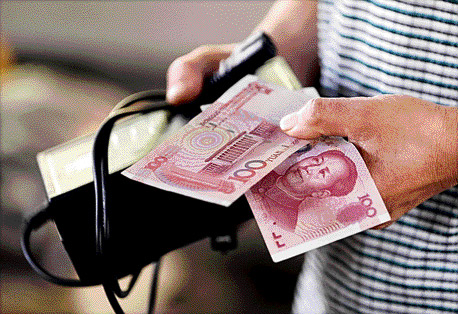
Zeti says the IMF’s move will help pave the way for broader use of the renminbi in trade and finance. — Reuters photo
KUALA LUMPUR: Bank Negara Malaysia (BNM) today welcomed the International Monetary Fund’s (IMF) latest move in adding China’s renminbi as a reserve currency, saying it would contribute much to stability in the international monetary system.
Governor Tan Sri Dr Zeti Akhtar Aziz said the development is very welcome and going forward, will see other currencies increase in significance as a reserve in the monetary system.
“Of course, the US dollar will still be the dominant currency, but having others like the euro, yen, sterling and now yuan, is an important development,” she told the media after officiating the “Iclif Leadership Energy Summit Asia 2015” yesterday.
Zeti said BNM was the first central bank globally to have received the Qualified Foreign Institutional Investor (QFII) status from the China authority in 2011, and has had the renminbi as its reserve.
“We already have the renminbi at a level that we are comfortable with.
We will access it and as the market grows in size, there will be an opportunity for further investments,” she added.
The IMF announced yesterday that the renminbi will join the fund’s basket of reserve currencies, namely the US dollar, euro, the yen and pound.
The last change made to the basket was in 2000, when the euro replaced the German mark and the French franc.
Zeti said the IMF’s move will help pave the way for broader use of the renminbi in trade and finance.
“The announcement of a clearing bank in Malaysia for the renminbi earlier was a major move, and with the QFII status, it will support its further use in settling trade and investment transactions.
“On our part, we are promoting awareness among importers and exporters on how they can benefit from greater use of the renminbi, and not be subject to the volatility of the “third currency” in bilateral trade.
“At the Asean level, for those countries that have significant trade with China, I do believe they will use the RMB as the trade currency, because in doing so, it will not expose them to the volatility of the third currency,” she added.
Meanwhile, in her speech when officiating the Iclif event, Zeti highlighted that central bankers need to excel as risk managers in knowing what can go wrong and preparing for the worst that is yet to come.
“It involves building the buffers to prepare for the unexpected events before they happen.
“When I am asked the question of how we are going to manage ‘the lift off’, namely the normalisation of interest rates by the US Federal Reserve, my response is, it is not what we will do now, but what we have done before that will see us through this period.
“It is not only the buffers that have been built, but the capability that has been developed to allow us to better intermediate, and thus absorb the shock in withstanding volatile financial flows that are already occurring in anticipation of this eventuality,” she added. — Bernama
